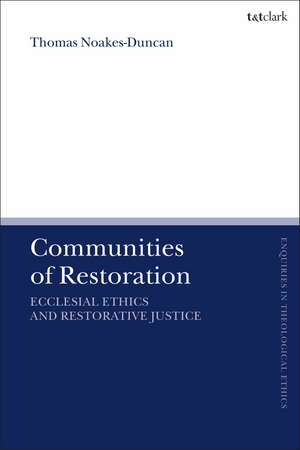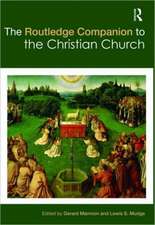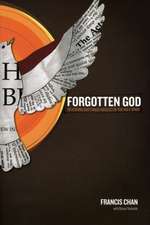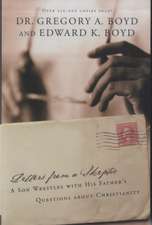Communities of Restoration: Ecclesial Ethics and Restorative Justice: T&T Clark Enquiries in Theological Ethics
Autor Dr Thomas Noakes-Duncanen Limba Engleză Paperback – 17 apr 2019
| Toate formatele și edițiile | Preț | Express |
|---|---|---|
| Paperback (1) | 231.89 lei 6-8 săpt. | |
| Bloomsbury Publishing – 17 apr 2019 | 231.89 lei 6-8 săpt. | |
| Hardback (1) | 714.92 lei 6-8 săpt. | |
| Bloomsbury Publishing – 18 oct 2017 | 714.92 lei 6-8 săpt. |
Din seria T&T Clark Enquiries in Theological Ethics
- 23%
 Preț: 192.01 lei
Preț: 192.01 lei - 30%
 Preț: 510.42 lei
Preț: 510.42 lei -
 Preț: 159.53 lei
Preț: 159.53 lei - 23%
 Preț: 193.45 lei
Preț: 193.45 lei - 30%
 Preț: 510.04 lei
Preț: 510.04 lei - 23%
 Preț: 196.96 lei
Preț: 196.96 lei - 23%
 Preț: 198.93 lei
Preț: 198.93 lei - 23%
 Preț: 192.19 lei
Preț: 192.19 lei - 23%
 Preț: 190.68 lei
Preț: 190.68 lei - 13%
 Preț: 230.33 lei
Preț: 230.33 lei - 30%
 Preț: 511.40 lei
Preț: 511.40 lei - 30%
 Preț: 511.40 lei
Preț: 511.40 lei - 22%
 Preț: 224.66 lei
Preț: 224.66 lei - 23%
 Preț: 191.92 lei
Preț: 191.92 lei - 30%
 Preț: 511.72 lei
Preț: 511.72 lei - 23%
 Preț: 222.93 lei
Preț: 222.93 lei - 22%
 Preț: 230.43 lei
Preț: 230.43 lei - 14%
 Preț: 542.02 lei
Preț: 542.02 lei - 22%
 Preț: 237.10 lei
Preț: 237.10 lei - 21%
 Preț: 215.88 lei
Preț: 215.88 lei - 23%
 Preț: 191.22 lei
Preț: 191.22 lei - 22%
 Preț: 231.63 lei
Preț: 231.63 lei - 28%
 Preț: 466.05 lei
Preț: 466.05 lei - 22%
 Preț: 240.68 lei
Preț: 240.68 lei - 30%
 Preț: 539.42 lei
Preț: 539.42 lei - 24%
 Preț: 196.54 lei
Preț: 196.54 lei - 30%
 Preț: 597.87 lei
Preț: 597.87 lei - 30%
 Preț: 510.99 lei
Preț: 510.99 lei - 21%
 Preț: 218.09 lei
Preț: 218.09 lei
Preț: 231.89 lei
Preț vechi: 297.64 lei
-22% Nou
Puncte Express: 348
Preț estimativ în valută:
44.37€ • 46.03$ • 37.00£
44.37€ • 46.03$ • 37.00£
Carte tipărită la comandă
Livrare economică 27 martie-10 aprilie
Preluare comenzi: 021 569.72.76
Specificații
ISBN-13: 9780567688002
ISBN-10: 0567688003
Pagini: 288
Dimensiuni: 156 x 234 x 23 mm
Greutate: 0.4 kg
Editura: Bloomsbury Publishing
Colecția T&T Clark
Seria T&T Clark Enquiries in Theological Ethics
Locul publicării:London, United Kingdom
ISBN-10: 0567688003
Pagini: 288
Dimensiuni: 156 x 234 x 23 mm
Greutate: 0.4 kg
Editura: Bloomsbury Publishing
Colecția T&T Clark
Seria T&T Clark Enquiries in Theological Ethics
Locul publicării:London, United Kingdom
Caracteristici
Illuminates the distinctive contribution of restorative justice as an expression of a "peacemaking justice" informed by the Mennonite-Anabaptist tradition
Notă biografică
Thomas Noakes-Duncan is Lecturer in Restorative Justice at Victoria University of Wellington, New Zealand.
Cuprins
IntroductionChapter 1Ecclesial Perspectives on Justice in Historical PerspectiveChapter 2The Ecclesial Turn in Christian EthicsChapter 3The Emergence of Restorative Justice in Ecclesial PracticeChapter 4The Theological Interpretation of Scripture and Biblical JusticeChapter 5A Parable of the Justice of God, Luke 15:11-32Chapter 6The Restorative Spirit in Christian Community, A Reading of First CorinthiansChapter 7Ecclesial Embodiments of Restorative Justice PracticeConclusionBibliographyIndex
Recenzii
This is a book that needs to be thought about and discussed, and has a contribution to make to the ongoing discussion.
[Noakes-Duncan's] book is a plea that we think more deeply about the idea of justice as a relational concept - reconciliation - made explicit in God's revelation in Christ as we have it in Scripture.
Despite its origins in the peace church tradition, restorative justice has yet to receive the attention it deserves from theological scholarship as a brilliant framework for elucidating the character of God's justice in Scripture. It also has the potential, as Thomas Noakes-Duncan demonstrates in this original and far-reaching study, to cast fresh light on the meaning and mission of the church. After establishing that the justice of God disclosed in Christ is fundamentally a restorative rather than a retributive justice, Noakes-Duncan shows how the church is created to embody and perform that same justice in its own distinctive life, worship and witness. This is an excellent contribution to the field of ecclesial ethics. It also provides a template for contemporary congregations to use as they work out what it means to be caught up in God's great work of restoring the world to wholeness.
In this timely, acute and wise study, Thomas Noakes-Duncan rightly identifies justice as a power that heals, restores, and reconciles rather than hurts, punishes, and kills. He gives us an excellent work of ecclesial ethics, because he is never satisfied not only until the church performs Jesus' story, but also until that story both learns from and profoundly enriches the world's story. How justice and the church ever got separated in imagination or practice is a tragedy: for how they should be correctly practised as the same thing, Noakes-Duncan here offers an articulate, vigorous and compelling account.
[Noakes-Duncan's] book is a plea that we think more deeply about the idea of justice as a relational concept - reconciliation - made explicit in God's revelation in Christ as we have it in Scripture.
Despite its origins in the peace church tradition, restorative justice has yet to receive the attention it deserves from theological scholarship as a brilliant framework for elucidating the character of God's justice in Scripture. It also has the potential, as Thomas Noakes-Duncan demonstrates in this original and far-reaching study, to cast fresh light on the meaning and mission of the church. After establishing that the justice of God disclosed in Christ is fundamentally a restorative rather than a retributive justice, Noakes-Duncan shows how the church is created to embody and perform that same justice in its own distinctive life, worship and witness. This is an excellent contribution to the field of ecclesial ethics. It also provides a template for contemporary congregations to use as they work out what it means to be caught up in God's great work of restoring the world to wholeness.
In this timely, acute and wise study, Thomas Noakes-Duncan rightly identifies justice as a power that heals, restores, and reconciles rather than hurts, punishes, and kills. He gives us an excellent work of ecclesial ethics, because he is never satisfied not only until the church performs Jesus' story, but also until that story both learns from and profoundly enriches the world's story. How justice and the church ever got separated in imagination or practice is a tragedy: for how they should be correctly practised as the same thing, Noakes-Duncan here offers an articulate, vigorous and compelling account.












